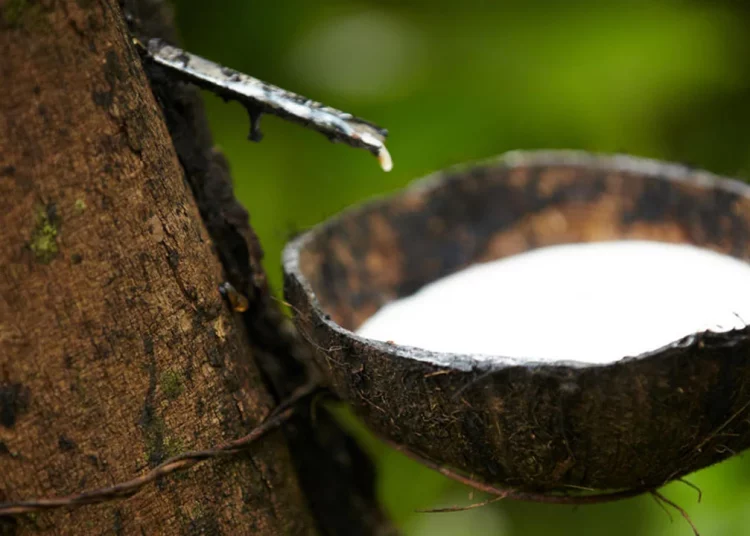The failure of the Presidential Initiative on Rubber, launched in 2006 to promote increased production and processing of rubber locally, has led to estimated annual loss of about N2 trillion in both foreign exchange and local currencies, LEADERSHIP can now reveal.
The experts gave the estimation based on gap in the rubber market as the country is yet to fully utilize its exporting potentials which could earn it more forex in an era of scarce foreign exchange.
According to information obtained by LEADERSHIP, the global demand for latex is 17million metric tonnes while Nigeria has exported rubber and its articles worth $22 trillion since 2009. Though impressive, experts said, the country is still far from its target and potentials.
The Presidential initiative was aimed at increasing production through resuscitation of plantations, establishment of new plantation in order to expand the number of hectares under cultivation, promotion of yield improvement using improved clones and to address technological and socio economic constraints militating against increased productivity, diversification of local use of rubber and to expand the market through provision of infrastructure and exploring more local and overseas market.
The chairman, Kwara State National Rubber Producers, Processor and Marketer Association of Nigeria, Prince Alex Ogundele, in an exclusive interview with LEADERSHIP, noted that, apart from the country’s export potentials, rubber is used in all sectors of the economy.
Ogundele listed its uses in chemical industry, such as; medical gloves, pacifier, breathingbag, sphygmomanometer, catheter, surgical tube, among others, while in the defence sector, its used for rubber bullets. In engineering, he said, rubber is used for safetyboot, machine parts, foldable kayak, and so on, even as it is used to produce football, rollers, balloon, inflatable boat, among others in sports.
In the electrical industry, rubber, he stressed, is used to produce insulators, conveyor belts, wire, window seals, and rubberized fabrics while in the petroleum industry, it is in high demand for automobile such as car seat, transmission belts, tube car tyres, and so on.
Unfortunately, the initiative, which was jointly funded by the Federal Government who must contribute 25 per cent of the funds needed, State Government with 30 per cent contribution, 5 per cent from Local Government, 30 per cent from private stakeholders and 10 per cent from donor agencies, failed to resuscitate the industry.
Currently, only about 40 per cent of Nigeria rubber potential is being exploited, due to abandonment and felling of trees, particularly, by smallholders for seemingly more lucrative annual food crop production.
The decline in NR production, findings show, is attributed to the marginalisation of rubber as an economic and strategic crop due to the discovery of crude oil, the aftermath of the dissolution of the Natural Rubber Board that gave rise to transient glut in the mid-1990s and a drastic drop in the price of the commodity.
Others are; the low yield due to uneconomic size of farmer’s holdings, old age of plantations leading to reduced stands per hectare, application of little or no agricultural inputs like fertilizer, unavailability of credit facilities, and pesticides.
Other notable challenges of the sector include; lack of medium and long term facilities and high cost of credit to finance private plantations.
Ogundele, who spoke on the need to reassess the importance of natural rubber as a very important option for development of non-oil sector in Nigeria, said, the current increased price of rubber is encouraging for rubber cultivation as an economically viable enterprise.
There are over 50 by-products of rubber, cutting across all major sectors.
He called on the federal government to restore confidence of some of the industries that make use of rubber byproducts but have divested from the country.
He listed some of them to include; Michelin and Dunlop, equally calling on government to promote and encourage establishment of small scale industries for value addition across the entire value chain.
Ogundele said, to acquire land, prepare it, source for seedlings, planting, weeding, pests and disease control, on one hectare of land, it will cost about N5 million but that the income is guaranteed after a successful harvest that is on one hectare. An investor, he said, is expected to have about 555 rubber trees on a flat land area with average yield of about 4280kg.
He calculated that the market value of rubber at the time of harvest determines the income but an average of N800, 000 per day is guaranteed. Though, gestation period is 5-6 years but tapping starts the following year for up to a period of 50 years.
Nigeria has exported rubber and its articles worth $22 trillion since 2009.
The highest was $10 trillion in 2012, while the lowest was last year with the value put at $21 million in 2020.
However, Nigeria exports of rubber have been on the low side since 2009, according to data provided by the International Trade Centre’s – Trade Map.
In 2009, Nigeria exported rubber and articles worth $175,452,000. The value increased to $558,945,000 in 2010. It was $7,455,527,000 in 2011, $10,102,281,000 in 2012, $2,399,602,000 in 2013; $ 92,020,000 in 2014; $63,417,000 in 2015, $ 40,280,000 in 2016; $ 55,253,000 in 2017, $ 41,978,000 in 2018, $ $42,080,000 in 2019 and $21,063,000 in 2020.
However, most rubber exports from Nigeria came from natural rubber, balata, gutta-percha, guayule, chicle and similar natural gums. Few volumes of exports were synthetic rubber and factice derived from oils, in primary forms or in plates, sheets or strip.
Experts believe if Nigeria can deepen its rubber export more, it will be able to generate at, least additional N2trillion annually into the government purse.
Nigeria is ranked the 12th largest producer of natural rubber in the world and second in Africa with an estimated output of 200,000 tonnes ,according to Food and Agriculture Organisation (FAO).











